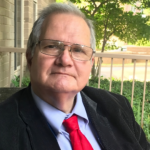
Hearing recently the account of David’s anointing as King of Israel, I was struck by its concluding detail: After Samuel anointed David, “from that day on, the Spirit of the Lord rushed upon David” (1 Sam 16:13).
Note the causality and the chronology: After Samuel anoints David, the “Spirit of the Lord rushed upon” him. Not kind of accompanied him. Not helped him. “Rushed upon him,” not unlike the noisy first Pentecost in Jerusalem.
Isn’t it odd God involves middlemen?
After all, if God is our “personal Savior,” as some may be wont to put it, why did he have Samuel anoint David? Why didn’t the “spirit of the Lord” just “rush” upon the ruddy lad?
Or, for that matter, when Jesus cured the man born blind, why did he bother with a mud paste and tell the guy—who already couldn’t see where he was going—to make his way to the pool of Siloam? Wouldn’t a simple “I say to you, brother: be healed!” suffice?
Same problem with those ten lepers. Why ship them off to the priests when all Jesus needed was a “be cured”?
Yes, our encounter with God is personal. But that doesn’t mean it’s isolatedly individualistic—that God is just doing “his thing” here with Jim Bob, there with Billie Jo, and over yonder with Tyler.
God meets us personally, but we as persons are also communal persons. We are persons who are parts of communities. That should be no surprise, because we are made in the image and likeness of a God who is Three Persons in a Community of Persons called the Trinity.
To be in a community means to fit somewhere in history in a generally verifiable way. Yes, the “spirit of the Lord” could have “rushed upon” David without Samuel and his horn of oil. But would anybody have believed him? Would anybody have paid attention to Jesse’s youngest kid, who, apparently, had been out in the sun with the sheep too long? We have an amazing capacity to deny even the evident: Jesus didn’t convince a lot of people after opening the blind man’s eyes. Indeed, those he didn’t took it as proof he was in league with the devil.
On the other hand, the prophetic act performed and certified by a bona fide prophet (who, by definition, spoke “in God’s name”) lends authority to what might otherwise seem to be the upstart Bethlehem insurrectionist against Saul. And we know when it happened: “From that day forward,” David acts clearly not by his own warrant, but by that of a higher authority.
Jesus involves the material world, originally created to be subordinate to human dominion but in which relationships became distorted by sin, in human redemption. A new man’s eyes are opened with the soil of the earth and the cleansing power of water. In all the sacraments, material elements touch man, who is a bodily-spiritual creature: water, chrism, bread, wine, oil, bodies. They’re not just add-ons; they are the normal way God touches the whole person.
And lest the leper evade Israel’s pandemic rules, he’s sent to the priest to certify the cure. Oh, and by the way, since certification of the cure involved making an offering to God, it was the least way to express gratitude to God—and perhaps its least expression from 90 percent of the cured beneficiaries.
Can God’s grace act independently of mediating realities: priests, things, sacraments? Yes. But God in his goodness choses to touch the whole man, a bodily-spiritual being who comes to know precisely through those senses, giving him personal (though not just individualistic) assurance while also institutionalizing his saving work through those mediating structures.
This question takes various forms. “Why do I need to confess my sins to a priest?” “Why do I need ‘marriage’ to prove our ‘love’?” “Do we really need to be baptized?” “Do we perform the Lord’s Supper because Jesus ordered us to?” Ultimately, all these specific variations broaden out into the larger picture: Why do we need sacraments, clergy, or even a “church”? Isn’t it just me and God?
Well, no—and especially if you’re somebody who wants to look for biblical warrants. It wasn’t “David and God.” It was David and Samuel in the midst of his father and brothers and other witnesses. It wasn’t “Jesus and the blind guy” but everyone they touched.
So if we want to follow the Lord’s way, perhaps we ought to look at how the Lord normally interacts with us: through mediating structures like institutions, people, and things. All these things are raised to the holy so that “the Spirit of the Lord” may rush upon us—and we may know this with surety.



